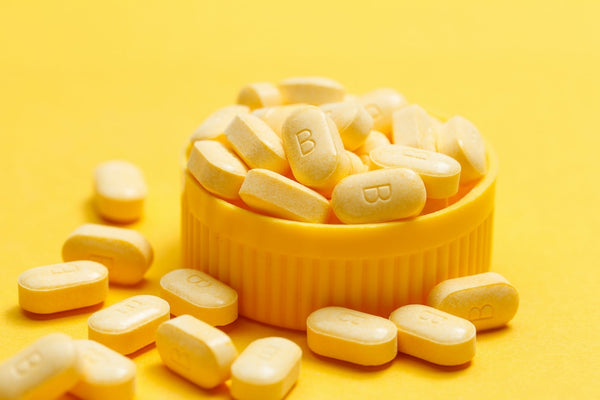
Surprising Benefits of Vitamins B for Skin

Vitamins B has recently received a lot of attention in the world of skincare, with many experts explaining how maximizing the function of this nutrient can benefit the skin both when ingesting it and when applying it on the skin.
Previously, vitamins B were considered only a single nutrient, but it was later discovered that these are chemically different vitamins that appear in the same food sources.
Site: These are the Benefits of Taking Vitamin B Supplements
The different vitamins are Vitamin B1 (thiamine), Vitamin B2 (riboflavin), Vitamin B3 (niacin), Vitamin B5 (pantothenic acid), Vitamin B6 (pyridoxine and pyridoxine), Vitamin B7 (biotin), Vitamin B9 (folic or folic acid). ), and Vitamin B12 (cobaltamine).
9 Surprising Benefits of Vitamins B for Skin
Eight vitamins B are necessary for almost every process in the body. Vitamin B Complex is also important for cell growth, development, and overall function. Thus, they offer profound benefits for the health of the skin, since our skin is constantly regenerating. The healthier your skin is, the faster it regenerates.
However, the human body has a relatively small storage tank of vitamin B, which means that we have to constantly refill it every day. Since each vitamin B affects the health of the skin differently, it is helpful to know which foods provide what vitamins, and the role of each vitamin in the body.
What Happens If We Are Deficient in Vitamin B?
Vitamin B deficiency can make skin conditions more rushed, causing acne, rashes, dry and flaky skin, chapped lips, and wrinkles. It can also make your skin more sensitive to sunlight, personal care products, and other potential aggressors, and therefore can cause redness and irritation.
Eight Vitamins, One B-Complex: A Recipe for Glowing Skin
What is the benefit of vitamin B for the skin? Vitamins B offers myriad skin health benefits, but the two most significant are cell renewal and stress relief. As you will see below, each of the eight parts in the complex has its own role for the skin.
1. B1 (Thiamine)
Its uses: Thiamine is the first B Vitamin ever discovered. It helps convert glucose into energy, helps wound healing, and is essential for proper nerve function. It is sometimes called an "anti-stress vitamin," which strengthens the immune system and calms the nervous system, helping to prevent stress-related acne.
Where to find it: Whole grains and cereals/seeds, wheat germ, peas, sunflower seeds, shellfish.
2. B2 (Riboflavin)
Its uses: B2 helps with cell turnover and collagen maintenance, which protects the structural integrity of your skin, reduces inflammation, and accelerates wound healing. It also helps the secretion of mucus in the skin, thus preventing dryness that causes oil production (which causes acne) and increasing the absorption of zinc, another essential mineral for skin health.
3. B3 (Niacin)
Its uses: A source of skin conditioning, B3 treats various skin conditions and irritations, including dermatitis, acne, rosacea, eczema, dry and sun-damaged skin, and hyperpigmentation. It is also a powerful anti-aging ingredient and thus, potent in skin care products for fine lines and wrinkles.
Where to find it: Turkey, chicken, dairy products, liver, mushrooms, fish, peas, bread, and fortified cereals
4. B5 (Pantothenic Acid)
Function: Humectant, B5 keeps moisture in the skin, which increases the elasticity of the skin and contributes to a face that appears fuller and hydrated. Since hydrated skin is also fresher, B5 can help prevent acne and reduce signs of aging as well.
Where to find it: Mushrooms, avocados, sweet potatoes, peas, chicken, turkey, broccoli
5. B6 (pyridoxine)
What it does: Another major stress reliever, B6 helps regulate mood and sleep by helping the body produce serotonin (the "happy hormone"), melatonin (the sleep hormone), and norepinephrine (the stress hormone). Stress and lack of sleep increase inflammation in the body, reduce cell regeneration and contribute to dryness—all factors that cause breakouts and premature aging.
6. B7 (Biotin)
Its uses: B7 is needed for fatty acid metabolism and protects cells from damage and water loss, helping to keep the skin moisturized and plump. Some signs of deficiency are brittleness, dry hair, brittle nails, and dry and scaly skin. Severe cases cause red and scaly skin.
Where to find it: Almonds, sweet potatoes, eggs, onions, grains, tomatoes, sardines, broccoli. Although it is often included in many hair care and skin care products, it is most beneficial when digesting.
7. B9 (Folic Acid)
Its uses: B9 works like an antioxidant to increase cell turnover and fight free radical damage. It is usually recommended as a prenatal vitamin because it helps prevent birth defects. Research also shows that when applied along with creatine, B9 fights off signs of sun damage and aging, which causes the skin to appear firmer.
Where to find it: Dark green leafy vegetables, asparagus, broccoli, oranges, legumes and legumes, okra, beans and seeds, beets
8. B12 (Cobalamin)
Its uses: B12 is beneficial for cell reproduction and can apply it for skin benefits as it reduces inflammation, dryness, and acne. Sometimes it is also to treat conditions such as psoriasis and eczema.
Where to find it: It is present only in animal products, although vegetarians can choose fortified foods.
Maximize With A Good Diet
Sometimes the simplest solution is best. Follow a diet rich in leafy green vegetables, lean proteins, and whole grains – a strategy that humans have long used as the best way to achieve good health.
It is also an effective way to look as healthy as you feel and shine from the inside out. After that, evaluate the diet to see where you might need improvement, and talk to a nutritionist if you want help creating a personalized plan.
That's the article 9 Surprising Benefits of Vitamin B for the skin. May it be useful!






